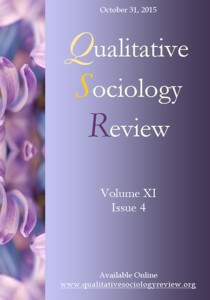Doing Poor in AmeriCorps: How National Service Members Deal With Living Below the Poverty Line
DOI:
https://doi.org/10.18778/1733-8077.11.4.06Keywords:
AmeriCorps, Poverty, Qualitative Methods, Identity Work, Social ClassAbstract
Many young AmeriCorps members enter a post-college lifestyle of food stamps, social services, and living below the poverty line. Using Simmel’s (1965) concept of poverty as a social category one is put into, and West and Fenstermaker’s (1995) concept of class as something one “does,” this paper looks at the AmeriCorps program, to examine how members “do poor.” In 22 in-depth interviews with a diverse sample of AmeriCorps members, I detail a member’s “typical” experience with poverty: first, encountering themselves in poverty, then working to disassociate themselves from having a “poor” identity, and, finally, still maintaining the positive experiences associated with their service.
Downloads
References
AmeriCorps. 2012a. “Benefits of AmeriCorps Service.” Retrieved August 13, 2015: www.americorps.gov.for_individuals/benefits/index.asp
Google Scholar
AmeriCorps. 2012b. “What is AmeriCorps?” Retrieved August 13, 2015: www.americorps.gov.for_individuals/why/index.asp
Google Scholar
AmeriCorps. 2012c. “AmeriCorps Vista.” Retrieved August 13, 2015: http://www.nationalservice.gov/programs/americorps/americorps-vista
Google Scholar
AmeriCorps NCCC. n.d. “AmeriCorps NCCC Service Through Teamwork.” Retrieved August 13, 2015: http://www.workforce.nd.gov/uploads/6/acnccc.pdf
Google Scholar
Barber, Kristen. 2011. “The Emotional Management of a Stranger: Negotiating Class Privilege and Masculine Academics as a Hurricane Katrina Evacuee.” Pp. 78-89 in Narrating the Storm: Sociological Stories of Hurricane Katrina, edited by D. A. Hidalgo and K. Barber. Newcastle: Cambridge Scholars Press.
Google Scholar
Best, Joel. 2008. Social Problems. New York: W.W. Norton & Company.
Google Scholar
Blyton, Paul and Jean Jenkins. 2007. Key Concepts in Work. London: Sage.
Google Scholar
DOI: https://doi.org/10.4135/9781446215814
Carano, Kenneth. 2013. “An Autoethnography: Constructing (& Interpreting) Cross-Cultural Awareness Through the Mind of a Peace Corps Volunteer.” The Qualitative Report 18:1-15.
Google Scholar
Coser, Lewis A. 1965. “The Sociology of Poverty.” Social Problems 13(2):140-148.
Google Scholar
DOI: https://doi.org/10.2307/798899
Crossley, Emilie. 2012. “Poor But Happy: Volunteer Tourists’ Encounters With Poverty.” Tourism Geographies 14(2):235-253.
Google Scholar
DOI: https://doi.org/10.1080/14616688.2011.611165
Faber, Stine T. 2012. “The Disavowal of Difference: Accessing Class and Symbolic Boundary Drawing in Interviews.” Qualitative Studies 3(2):181-197.
Google Scholar
DOI: https://doi.org/10.7146/qs.v3i2.7309
Frumkin, Peter and JoAnn Jastrzab. 2010. Serving Country and Community: Who Benefits From National Service? Cambridge, MA: Harvard University Press.
Google Scholar
DOI: https://doi.org/10.2307/j.ctv22jnv2x
Frumkin, Peter et al. 2009. “Inside National Service: AmeriCorps’ Impact on Participants.” Policy Analysis and Management 28(3):394-416.
Google Scholar
DOI: https://doi.org/10.1002/pam.20438
Goffman, Erving. 1963. Stigma: Notes on the Management of Spoiled Identity. New York: Simon and Schuster.
Google Scholar
Haney, Timothy J. 2011. “Disaster and the Irrationality of ‘Rational’ Bureaucracy: Daily Life and the Continuing Struggles After Hurricane Katrina.” Pp. 128-138 in Narrating the Storm: Sociological Stories of Hurricane Katrina, edited by D. A. Hidalgo and K. Barber: Newcastle: Cambridge Scholars Press.
Google Scholar
Hoy, Michael, Brennan Scott Thompson, and Buhong Zheng. 2010. “Empirical Issues in Lifetime Poverty Measurement.” Economics Publications and Research Paper 31. Retrieved August 13, 2015 http://www.researchgate.net/publication/46474324_Empirical_Issues_in_Lifetime_Poverty_Measurement
Google Scholar
Jackson, Jeffrey T. and Kirsten A. Dellinger. 2011. “Volunteer Voices: Making Sense of Our Trip to the Mississippi Gulf Coast After Katrina.” Pp. 106-128 in Narrating the Storm: Sociological Stories of Hurricane Katrina, edited by D. A. Hidalgo and K. Barber: Newcastle: Cambridge Scholars Press.
Google Scholar
Marshall, Will and Marc Porter Magee. 2005. The America Experiment and the Future of National Service. Washington: Horizon Communications.
Google Scholar
McBride, Amanda Moore et al. 2011. “Stipends in Volunteer Civic Service: Inclusion, Retention, and Volunteer Benefits.” Public Administration Review 71(6):850-858.
Google Scholar
DOI: https://doi.org/10.1111/j.1540-6210.2011.02419.x
Mickelson, Kristin D. and Stacey L. Williams. 2008. “Perceived Stigma of Poverty and Depression: Examination of Interpersonal and Interpersonal Mediators.” Journal of Social and Clinical Psychology 27(9):903-930.
Google Scholar
DOI: https://doi.org/10.1521/jscp.2008.27.9.903
Morris, Edward R. 2012. “Repelling the ‘Rutter’: Social Differentiation Among Rural Teenagers.” Symbolic Interaction 35(3):301-320.
Google Scholar
DOI: https://doi.org/10.1002/symb.26
Reutter, Linda I. et al. 2009. “‘Who Do They Think We Are, Anyway?’: Perceptions of and Responses to Poverty Stigma.” Qualitative Health Research 19(3):297-311.
Google Scholar
DOI: https://doi.org/10.1177/1049732308330246
Rosenblum, Karen E. and Toni-Michelle C. Travis. 2008. The Meaning of Difference: American Constructions of Race, Sex and Gender, Social Class, Sexual Orientation, and Disability. Boston: McGraw-Hill.
Google Scholar
Rubin, Herbert J. and Irene S. Rubin. 2012. Qualitative Interviewing: The Art of Hearing Data. Thousand Oaks, CA: Sage.
Google Scholar
Segal, Eli J. 1994. AmeriCorps: Coming Soon to Communities Everywhere. Washington: Corporation for National Service.
Google Scholar
Simmel, Georg. 1965. “The Poor.” Social Problems 13:118-139.
Google Scholar
DOI: https://doi.org/10.1525/sp.1965.13.2.03a00030
U.S. Department of Health and Human Services. 2012. “2012 HHS Poverty Guidelines.” Retrieved August 13, 2015: https://aspe.hhs.gov/2012-hhs-poverty-guidelines
Google Scholar
West, Candace and Sarah Fenstermaker. 1995. “Doing Difference.” Gender & Society 9(1):8-37.
Google Scholar
DOI: https://doi.org/10.1177/089124395009001002
West, Candace and Don H. Zimmerman. 2009. “Accounting for Doing Gender.” Gender & Society 23(1):112-122.
Google Scholar
DOI: https://doi.org/10.1177/0891243208326529
Downloads
Published
How to Cite
Issue
Section
License

This work is licensed under a Creative Commons Attribution-NonCommercial-NoDerivatives 4.0 International License.











